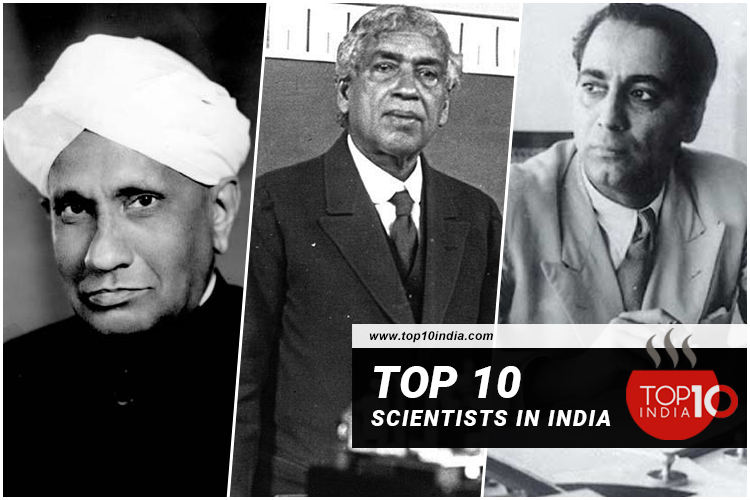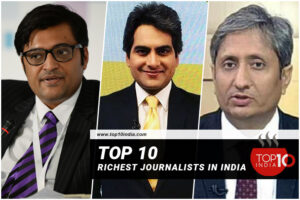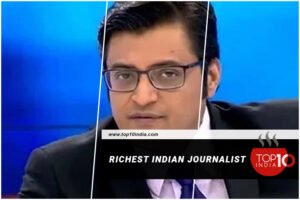Top 10 scientists in India:- Science is an inevitable part of life. Scientists are curious persons who invent new things and observes how things work. Scientists like to resolve problems by doing experiments. Many scientists worldwide work and research in their respective areas like astronomers, botanists, Physicists, Chemists, Biologists, Geologists, etc.
Top 10 scientists in India
India is a developing country with a vast history of geniuses and scientists whose work in science and technology has been highly appreciated across the world. Some Indian scientists have changed the world with their innovations and created history by setting standards for creativity.
No.1 CV Raman
Sir Chandrashekhar Venkata was an Indian physicist known mainly for his work in the field of light scattering. With his student K. S. Krishnan, he discovered that when light traverses a transparent material, some deflected light changes wavelength and amplitude. This phenomenon was a new type of light scattering and was subsequently termed the Raman effect (Raman scattering). Raman won the 1930 Nobel Prize in Physics and was the first Asian person to receive a Nobel Prize in any branch of science.
- Born:- 7 November 1888
- Died:- 21 November 1970
- Fields:- Physics
- Known for:- Raman Effect
- Education:- University of Madras and Presidency College
- Awards:- Nobel prize and Bharat Ratna
No.2 JC Bose
Jagdish Chandra Bose was a biologist, physicist, botanist, and early writer of science fiction. He pioneered the investigation of radio and microwave optics, made significant contributions to plant science, and laid the foundations of experimental science in the Indian subcontinent. IEEE named him one of the fathers of radio science. Bose is considered the father of Bengali science fiction and invented the crescograph, a device for measuring the growth of plants.
- Born:- 30 November 1858
- Died:- 23 November 1937
- Fields:- Physics and Biology
- Known for:- Millimetre waves, Radio, Crescograph
- Education:- University College London
- Awards:- Knight Bachelor and Order of the Star of India
No.3 Homi J. Bhabha
Homi Jehangir Bhabha was an Indian nuclear physicist, founding director, and professor of physics at the Tata Institute of Fundamental Research (TIFR). Colloquially known as “father of the Indian nuclear programme”, Bhabha was also the founding director of the Atomic Energy Establishment, Trombay (AEET), now named the Bhabha Atomic Research Centre in his honour.
- Born:- 30 October 1909
- Died:- 24 January 1966
- Fields:- Nuclear physics
- Known for:- Indian nuclear-programmed cascade process of Cosmic radiations
- Education:- Cambridge University
- Awards:- Adams prize and Padma Bhushan
No.4 S. Ramanujan
Shrinivas Ramanujan was an Indian mathematician who lived during the British Rule in India. Though he had almost no formal training in pure mathematics, he made substantial contributions to mathematical analysis, number theory, infinite series, and continued fractions, including solutions to mathematical problems that considered unsolvable.
- Born:- 22 December 1887
- Died:- 26 April 1920
- Fields:- Mathematics
- Known for:- Ramanujan sum
- Education:- Trinity College London
- Awards:- Fellow of the royal society
No.5 M. Vishvesvaraya (Top 10 Scientists in India)
Sir M. Vishvesvaraya, commonly known as Sir MV, was an Indian civil engineer, statesman and the 19th Diwan of Mysore, serving from 1912 to 1919. He pursued his degree from one of the best and the 3rd oldest engineering college in Asia, the College of Engineering, Pune. MV received India’s highest honour, the Bharat Ratna, in 1955. Vishvesvaraya was knighted as a Knight Commander of the British Indian Empire (KCIE) by King George V to contribute to the public good.
- Born:- 15 September 1961
- Died:- 12 April 1962
- Fields:- Civil Engineer
- Known for:- Krishna Raja Sagara Dam
- Education:- the University of Madras and University of Bombay
- Awards:- Bharat Ratna
No.6 Dr. APJ Abdul Kalam (Top 10 Scientists in India)
Avul Pakir Jainulabdeen Abdul Kalam was an Indian aerospace scientist who served as the 11th President of India from 2002 to 2007. Kalam was born and raised in Rameswaram, Tamil Nadu and studied physics and aerospace engineering. He spent the next four decades as a scientist and science administrator, mainly at the Defence Research and Development Organisation (DRDO) and Indian Space Research Organisation (ISRO) and was intimately involved in India’s civilian space programme and military missile development efforts. Moreover thus came to be known as the Missile Man of India for his work on developing ballistic missile and launch vehicle technology.
- Born:- 15 October 1931
- Died:- 27 July 2015
- Fields:- Aerophysics
- Known for:- Pokhran Nuclear test
- Education:- Madras Institute of Technology
- Awards:- Padam Bhushan and Bharat Ratna
No.7 Vikram Sarabhai
Vikram Ambalal Sarabhai was an Indian physicist and astronomer who initiated space research and helped develop nuclear power in India. He was honoured with Padma Bhushan in 1966 and the Padma Vibhushan in 1972. He is internationally regarded as the Father of the Indian Space Program
- Born:- 12 August 1919
- Died:- 30 December 1971
- Fields:- Physics
- Known for:- Indian space program and Indian Institute of Management Ahmedabad
- Education:- University of Cambridge
- Awards:- Padma Bhushan and the Padma Vibhushan
No.8 Prafulla Chandra Ray (Invented By Indian Scientists)
Acharya Sir Prafulla Chandra Ray was an eminent Bengali chemist, educationist, historian, industrialist and philanthropist. He established the first modern Indian research school in chemistry and is regarded as the father of chemical science in India.
- Born:- 2 August 1961
- Died:- 16 June 1944
- Fields:- Chemistry
- Education:- University of Calcutta
- Awards:- Fellow of the Indian Association for the Cultivation of Science (FIAS)
No.9 Satyendra Nath Bose (Top 10 scientists in India 2021)
Satyendra Nath Bose is an Indian mathematician and physicist specialising in theoretical physics. He is best known for his work on quantum mechanics in the early 1920s, collaborating with Albert Einstein in developing the foundation for Bose-Einstein statistics and the theory of the Bose-Einstein condensate. A Fellow of the Royal Society, he was awarded India’s second-highest civilian award, the Padma Vibhushan, in 1954 by the Government of India.
- Born:- 1 January 1894
- Died:- 4 February 1974
- Fields:- Physics
- Known for:- Bose-Einstein condensate
- Education:- University of Calcutta
- Awards:- Padma Vibhushan
No.10 S Chandrashakera (Top 10 scientists in India)
Subrahmanyan Chandrasekhar was an Indian-American astrophysicist, Astronomer and Physicist who spent his professional life in the United States. He was awarded the 1983 Nobel Prize for Physics with William A. Fowler for “theoretical studies of the physical processes of importance to the structure and evolution of the stars”. His mathematical treatment of stellar evolution yielded many of the current theoretical models of the later evolutionary stages of massive stars and black holes. The Chandrasekhar limit is named after him.
- Born:- 19 October 1910
- Died:- 21 August 1995
- Fields:- Astrophysics
- Known for:- Chandrasekhar
- Education:- University of Madras and Trinity College, Cambridge
- Awards:- National Medal of Science and Nobel Prize
FAQ (Top 10 scientists in India)
1. Who is the first Asian scientist to win a noble prize?
CV Raman is the first Asian scientist to win a noble prize.
2. Who is known as the Missile Man of India?
Dr APJ Abdul Kalam is known as the Missile Man of India.
3. Which scientist worked with Einstein?
JC Bose worked with Einstein.
4. Which scientist lived most of his professional life in the USA?
Subrahmanyan Chandrasekhar scientist lived most of his professional life in the USA.



















Be First to Comment